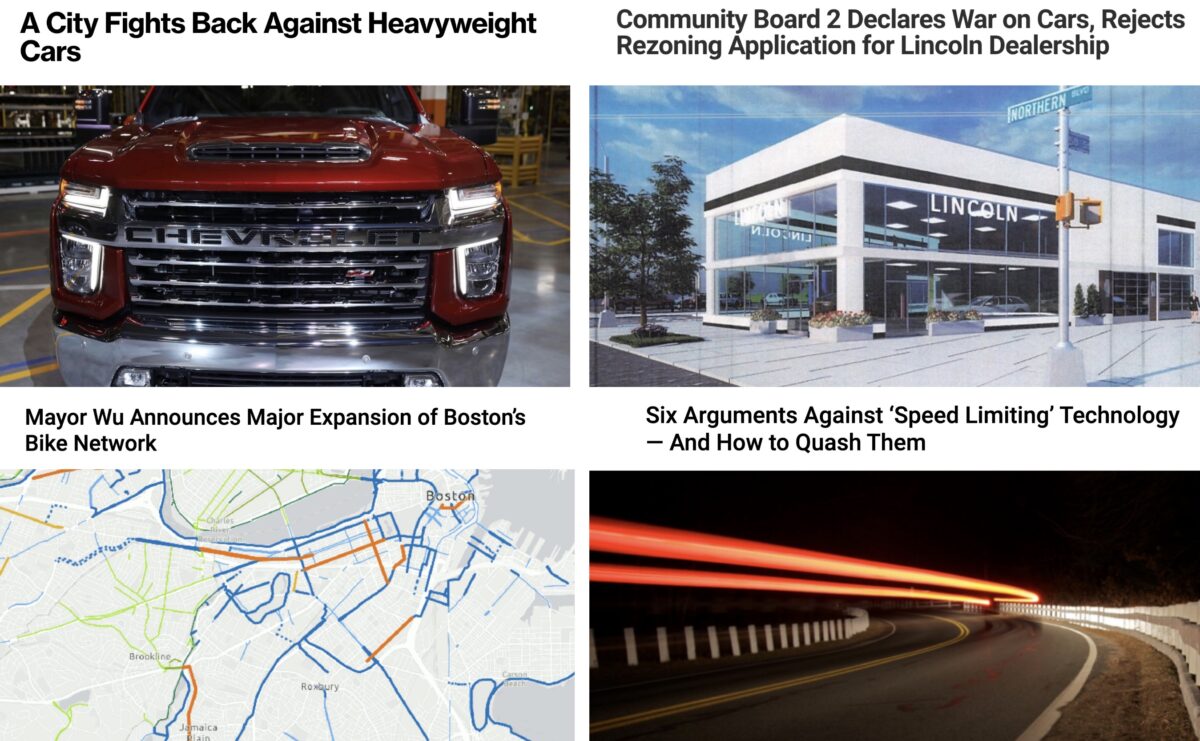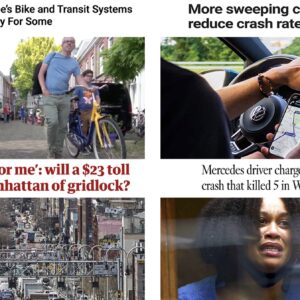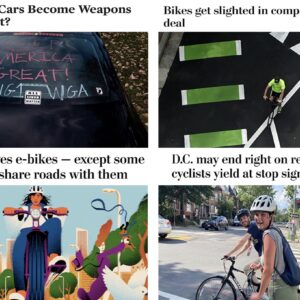Welcome to the week.
Here are the most notable stories our writers and readers came across in the past seven days…
Make them pay: A proposal in Washington D.C. would make owners of massive trucks pay an extra $500 registration fee to offset their extreme impacts on streets and human lives. (Bloomberg)
Highway error: Take a visual journey into how America’s highway builders and the politicians that enable them have displaced thousands with their projects and they just keep marching on despite a disgusting legacy of racism and exploitation. (NY Times Opinion)
Just say no to cars: A community board in New York City has done something amazing: They rejected a car dealership project simply because it sells cars. (Sunnyside Post)
The cost of EVs: Please take time to learn about what we do to the earth to mine materials needed for electric batteries. (Washington Post)
How to fix America: This article takes a much-needed systemic view of why America has so many deadly health outcomes and it proposes ways to fix them. I like how the author connects the dots between housing, transportation, and health. (The Atlantic)
This is how you do it: I am in love with the approach Boston’s Mayor Wu is taking with a clear and confident announcement that she wants to make biking better in Boston. This is the type of leadership Portland is severely lacking. (Streetsblog – City of Boston Announcement)
E-bike rebates are working: The City of Denver’s e-bike rebate program is not only wildly popular, but data provided by Portland-based Ride Report says people are using the bikes to replace car trips. (Denver Post)
Generational divide: The choices people make about car use have a lot to do with when they were born, says this writer who explores the gap between her and her mom. (New York Times)
Speed debating: Technology to limit speeds of cars and trucks is coming, and this little guide will help you argue against the haters who will fight tooth-and-nail against it. (Streetsblog)
Thanks to everyone who sent in links this week!







Thanks for reading.
BikePortland has served this community with independent community journalism since 2005. We rely on subscriptions from readers like you to survive. Your financial support is vital in keeping this valuable resource alive and well.
Please subscribe today to strengthen and expand our work.
Lithium mining is bad. Is there any large-scale mining that isn’t?
Electric vehicles are going to start coming faster and faster. The only practical solution I see to the resource issue is shared fleet vehicles, which I believe will become the dominant economic model when automated driving hits prime time.
I’ve come to view electric bikes as just the smallest electric cars, and suspect in the future, we’ll see a wider range of car styles and sizes than we do today, especially if I’m right about fleets (it will be easier to match users with appropriately-sized vehicles on a per-ride basis than it is today where most people own a single vehicle which has to do everything they could imagine doing when they buy it).
If our future has fewer cars than we have today, that will lower the total environmental cost.
I think that’s a huge “if” considering our society’s consumerist penchant for personal ownership. I hope you’re right, though.
FWIW, re: lithium batteries, there’s been some INCREDIBLY exciting news about an alternative on the near horizon: Sodium Ion batteries. I’ve been following what’s been going on in battery technology off an on for a about 15 years now and this is the first one I’ve seen that seems to actually be living up to the hype. Not just a “promising technology,” they are already being commercially produced by companies like Natron and Faradion. And it seems and they have even been proven to be effective for ebike use (though the study is behind a paywall, so I can only read the abstract). We should start seeing them available to consumers in the next year or so based on everything I’ve read. Pretty exciting stuff. The wikipedia article on the subject is a good place to start for the curious.
This would be great if it pans out. One nice thing about EVs is you can use different battery chemistry with the same infrastructure, so as technology improves, it’s relatively easy to “upgrade”.
It’s not at all cool to point out that that some of the negative externalities of batteries are being (or could be) mitigated on this urbanist “low car” blog. Apparently the correct thing to do as a low-car advocate is to constantly promote anti-electrification rhetoric while owning and driving a fossil-fuel-combusting SUV.
Maybe it’s because you’ve added a layer of sarcasm that’s getting in my way of seeing through to your point, but I honestly can’t follow your line of reasoning here, soren. How does anyone interested in policy assess the costs and benefits of different options if they aren’t presented with information about those costs and benefits, e.g. of mining?
Every few weeks on this blog there is a negative link and/or comment on battery energy storage. And often these links point to sources that are not particularly credible or science based. (I could not read the current link due to a 404 error so my comment has nothing to do with that piece.)
If there were discussion of the cost – benefit of battery storage on this blog my above comment would have had less sarcasm.
The “Cost of EVs” link to the WaPo goes to a 404 page for me.
Seconding. A quick search on WaPo doesn’t bring up a matching article. Perhaps it was taken down.
This may be the link you are looking for.
See how electric cars are reshaping this South American desert – The Washington Post
I would very much like to see the day that motorized vehicles have speed limiters installed. Personally, I use the cruise control function in my motorized vehicle most of the time, principally to prevent me from speeding. Mazda’s particular form of cruise control is very effective at keeping the vehicle at the programmed speed, even when going downhill – and I don’t even have the adaptive version the latest models have.